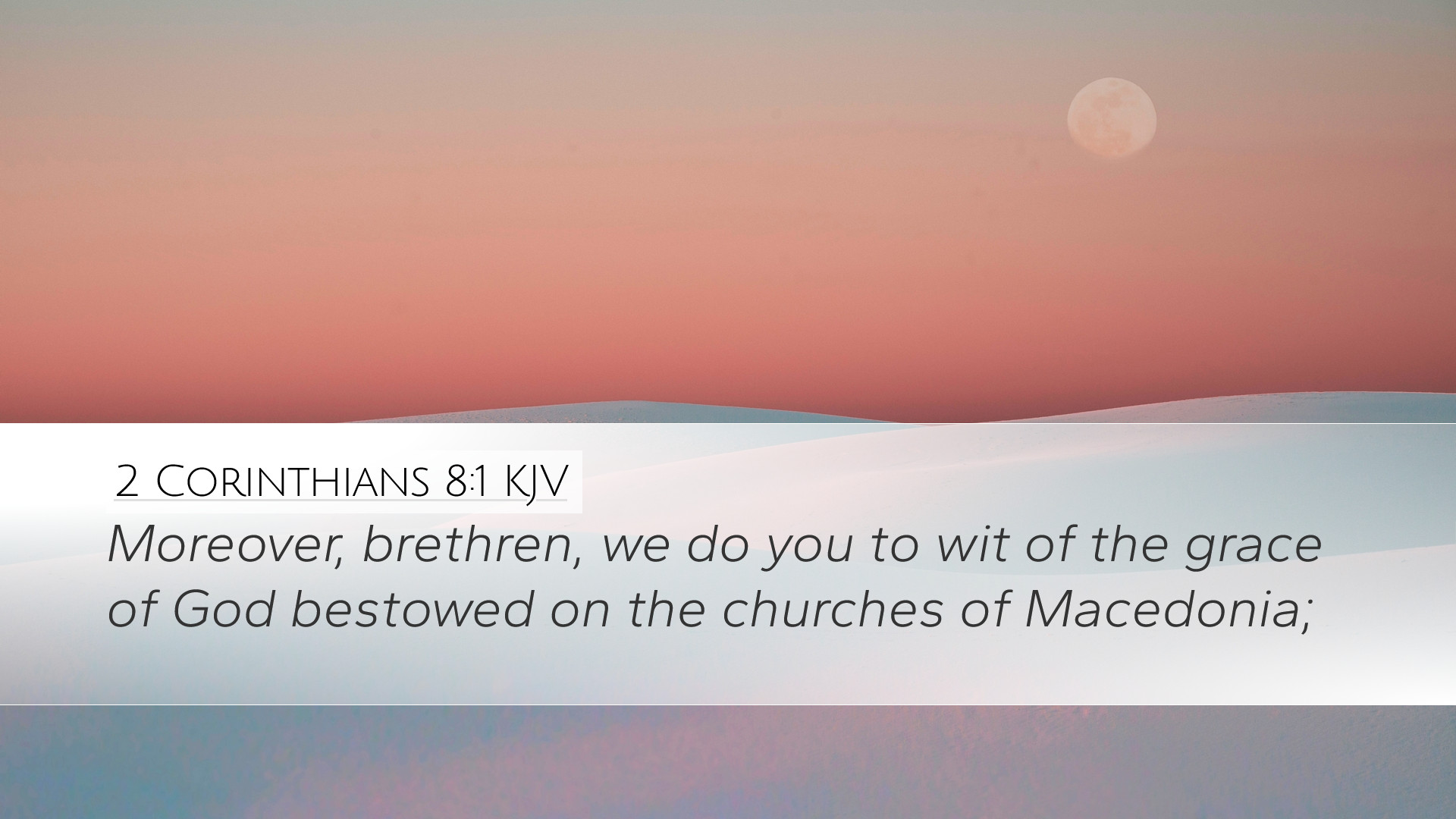Commentary on 2 Corinthians 8:1
Verse Reference: 2 Corinthians 8:1 - "Moreover, brethren, we do you to wit of the grace of God bestowed on the churches of Macedonia."
Introduction
This verse serves as an introduction to a significant teaching on generosity and communal support within the context of the early Church. The Apostle Paul is addressing the Corinthian believers, inviting them to consider the exemplary attitude of the Macedonian churches regarding their grace-fueled giving.
Contextual Overview
The surrounding context reveals Paul's intentions in rallying support for the impoverished church in Jerusalem. He contrasts the generosity of the Macedonian believers with the Corinthians, encouraging them to follow in the footsteps of those who demonstrated faith and love through their charitable acts.
Insights from Matthew Henry
Observations on Grace: Matthew Henry emphasizes that the gift of grace is fundamental to understanding the Macedonian churches' actions. He suggests that their generosity was not compulsory but emerged from a profound experience of God’s grace. This fundamentally changes the way we perceive giving; it is rooted in the character of God’s generosity toward us.
Macedonian Example: Henry notes the significance of the Macedonians' willingness to give, even in their own poverty, as a model for all believers. Despite their trials, they overflowed in generosity, illustrating the concept that true giving is a direct response to God’s blessings. The correlation between their affliction and abundance in joy is a reminder of the paradox of Christian generosity.
Insights from Albert Barnes
Grace Defined: Barnes extensively discusses how the term "grace" applies to the Macedonians' actions. He defines 'grace' not only as unmerited favor but also as a powerful motivator for action in believers' lives. Their willingness to share what little they had speaks volumes to the transforming nature of grace.
Churches of Macedonia: Barnes also provides historical context regarding the geographical and spiritual state of the Macedonian churches. He highlights their struggles but also their fervent spirit, indicating that circumstances do not hinder God’s work in the hearts of His people. The churches in Philippi, Thessalonica, and Berea provide a rich tapestry of examples illustrating faithful obedience amid poverty.
Insights from Adam Clarke
Characteristics of Generosity: Clarke elaborates on the character traits exhibited by the Macedonian churches, noting their joy and liberality despite their afflictions. He mentions that their joy emanated not from their circumstances, but from their relationship with God, emphasizing that giving joyfully is a true reflection of one’s heart toward God.
Encouragement for the Corinthians: Clarke points out that Paul's aim in presenting this example to the Corinthians was to motivate them by inspiration rather than compulsion. He wanted them to recognize that their ability to give stems from the grace of God and that they should also find joy in the act of giving.
Theological Implications
- Divine Grace as the Source of Generosity: The verse emphasizes that all giving should stem from a recognition of God’s grace. It challenges believers to reflect on how their personal experiences of grace influence their attitudes towards giving.
- The Relationship Between Joy and Generosity: The Macedonians exemplify that true generosity often flourishes in the presence of genuine joy and faith, contrasting typical worldly views of scarcity and self-preservation.
- The Church's Role in Supporting One Another: Paul’s message underscores the collective responsibility of the Church. It serves as a call to action for believers to care for one another, especially during times of hardship.
Practical Applications
For Pastors: This passage invites pastors to teach their congregations about the connection between grace and generosity. It provides an opportunity to explore the ways the church can engage in communal support, especially in missions and outreach.
For Students and Theologians: The insights from this scripture highlight the importance of understanding the sociocultural context of early Church communities. Students are encouraged to analyze the dynamics of wealth, poverty, and communal support that shaped the early Christian experience.
For Scholars: This verse opens avenues for deeper theological inquiry regarding the nature of grace and its manifestation in community life. Scholars can explore the implications of Paul’s appeal to the Corinthians and how it parallels contemporary discussions on stewardship and social responsibility.
Conclusion
In 2 Corinthians 8:1, the Apostle Paul lays a firm foundation for his teaching on generosity by invoking the example of the Macedonian churches. By intertwining the themes of grace and communal responsibility, the verse challenges not only the Corinthians but also believers today to reflect on their response to God's grace in their lives and to act generously, regardless of their circumstances.


